Plot summary
The fugitive Gezun of Lorsk, seeking his fortune in the great city of Torrutseish, becomes enamoured with the slave girl Yorida. At his urging, she flees with him from the house of her master, the wizard Derezong Taash, only to be kidnapped by the conspirator Lord Noish as a pawn in the latter's plot to attain the position of chief minister to the king. Noish intends on using the girl as a bribe to secure the aid of the cannibalistic Hercynian shaman Zyc. Gezun must somehow spirit her out of the clutches of the nefarious duo while there is still time.
Noish successfully deposes of Lord Haldu, the chief minister, using Zyc's magical truth drug, but then refuses payment to the wizard Bokarri, who recommended Zyc, thus offending him. When Noish finally captures Yorida and delivers her to Zyc and his servant Kumo, the so-called Yorida is revealed to be a magical simulacrum. Enraged, the two men kill and eat Noish while Yorida remains more-or-less contentedly with Derezong. Meanwhile, Gezun leaves for more profitable pastures. He and Bokarri will re-encounter each other in the later tale "The Rug and the Bull."
Chronologically, "The Hungry Hercynian" is the fourth of de Camp's Pusadian tales, and the second to feature his protagonists Gezun of Lorsk, Derezong Taash, and Zhamel Seh. [1]
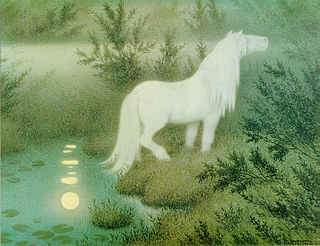
A fantasy world or fictional world is a world created for fictional media, such as literature, film or games. Typical fantasy worlds feature magical abilities. Some worlds may be a parallel world connected to Earth via magical portals or items ; an imaginary universe hidden within ours ; a fictional Earth set in the remote past or future ; an alternative version of our History ; or an entirely independent world set in another part of the universe.

The Hyborian Age is a fictional period of Earth's history within the artificial mythology created by Robert E. Howard, serving as the setting for the sword and sorcery tales of Conan the Barbarian.
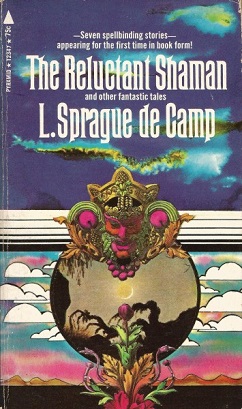
The Reluctant Shaman and Other Fantastic Tales is a collection of short stories by American science fiction and fantasy author L. Sprague de Camp, first published in paperback by Pyramid Books in November 1970. An E-book edition was published by Gollancz's SF Gateway imprint on September 29, 2011 as part of a general release of de Camp's works in electronic form. The pieces were originally published between 1939 and 1958 in the magazines Thrilling Wonder Stories, Unknown, and Fantastic Universe. The collection has also been translated into French and German.

The Tritonian Ring and Other Pusadian Tales is a 1953 collection of stories by American science fiction and fantasy author L. Sprague de Camp, first published in hardcover by Twayne Publishers. An E-book edition was published as The Tritonian Ring and Other Pasudian [sic] Tales by Gollancz's SF Gateway imprint on September 29, 2011 as part of a general release of de Camp's works in electronic form. The pieces were originally published between 1951 and 1953 in the magazines and anthologies Two Complete Science Adventure Books, Fantasy Fiction, Imagination Stories of Science and Fantasy, and Fantastic Adventures. The title story, the novel The Tritonian Ring has also been published separately.
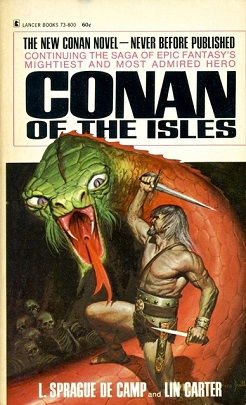
Conan of the Isles is a fantasy novel by American writers L. Sprague de Camp and Lin Carter, featuring Robert E. Howard's sword and sorcery hero Conan the Barbarian. It was first published October 1968 in paperback by Lancer Books, and reprinted in July 1970, 1972, and May 1973; publication was then taken over by Ace Books, which reprinted the novel in May 1977, May 1979, April 1980, July 1981, April 1982, November 1982, November 1983, June 1984, September 1986, February 1991, and May 1994. The first British edition was published in paperback by Sphere Books in December 1974 a number of times since by various publishers. It has also been translated into French, German, Hungarian, Italian, Spanish, Russian and (supposedly) Japanese.
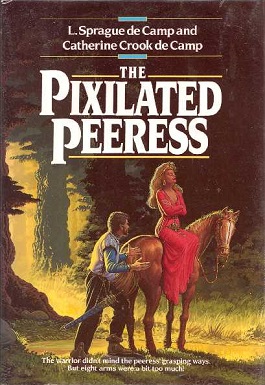
The Pixilated Peeress is a fantasy novel by American writers L. Sprague de Camp and Catherine Crook de Camp. It is the second book in their sequence of two Neo-Napolitanian novels, following The Incorporated Knight. It was first published in hardcover by Del Rey Books in August 1991, and in paperback by the same publisher in September 1992. An E-book edition was published by Gollancz's SF Gateway imprint on September 29, 2011 as part of a general release of de Camp's works in electronic form.

"The Emperor's Fan" is a fantasy short story by American writer L. Sprague de Camp, the fourth of his Novarian series. It was first published in Astounding: The John W. Campbell Memorial Anthology, edited by Harry Harrison, in 1973. It has since been reprinted in other anthologies, including The Year's Best Fantasy Stories, edited by Lin Carter (1975), as well as such collections of de Camp's work as The Best of L. Sprague de Camp (1978) and Footprints on Sand (1981). It has also been translated into German.
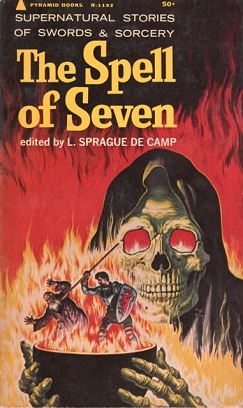
The Spell of Seven is an anthology of fantasy short stories in the sword and sorcery subgenre, edited by L. Sprague de Camp and illustrated by Virgil Finlay. It was first published in paperback by Pyramid Books in June 1965, and reprinted in December 1969. It was the second such anthology assembled by de Camp, following his Swords and Sorcery (1963).

The Pusadian series is a sequence of fantasy stories by L. Sprague de Camp, begun in the early 1950s and written under the influence of Robert E. Howard's Conan stories. The series, also known as the Poseidonis series, prefigured the numerous sword & sorcery settings of the 1960s and 1970s.
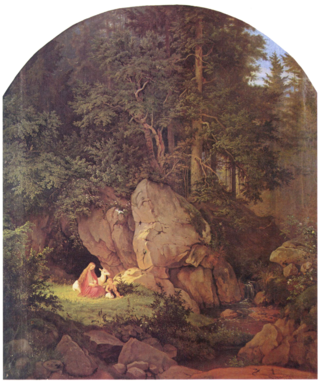
In folklore and fantasy, an enchanted forest is a forest under, or containing, enchantments. Such forests are described in the oldest folklore from regions where forests are common, and occur throughout the centuries to modern works of fantasy. They represent places unknown to the characters, and situations of liminality and transformation. The forest can feature as a place of threatening danger, or one of refuge, or a chance at adventure.

The Tritonian Ring is a heroic fantasy novel written by L. Sprague de Camp as part of his Pusadian series. It was first published in the magazine Two Complete Science Adventure Books for Winter, 1951, and first appeared in book form in de Camp's collection The Tritonian Ring and Other Pusadian Tales. Its first publication as a stand-alone novel was as a paperback by Paperback Library in 1968; the first hardcover edition was from Owlswick Press in 1977. An E-book edition was published as The Tritonian Ring and Other Pasudian [sic] Tales by Gollancz's SF Gateway imprint on September 29, 2011 as part of a general release of de Camp's works in electronic form.

"The Owl and the Ape" is a fantasy story by American writer L. Sprague de Camp, part of his Pusadian series. It was first published in the magazine Imagination: Stories of Science and Fantasy for November, 1951, and first appeared in book form in the de Camp's collection The Tritonian Ring and Other Pusadian Tales. The story has also appeared in the anthology Kingdoms of Sorcery (1976). and the de Camp omnibus collection Lest Darkness Fall/Rogue Queen/The Tritonian Ring and Other Pusadian Tales (2014). It has also been translated into German.
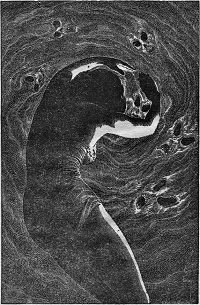
"The Eye of Tandyla" is a fantasy story by American writer L. Sprague de Camp, part of his Pusadian series. It was first published in the magazine Fantastic Adventures for May, 1951, and first appeared in book form in de Camp's collection The Tritonian Ring and Other Pusadian Tales. The story has also appeared in the magazine Fantastic for November 1965, the anthologies Time Untamed (1967), The Magic of Atlantis (1970), Wizards (1983), and The Mammoth Book of Seriously Comic Fantasy (1999), and the de Camp omnibus collection Lest Darkness Fall/Rogue Queen/The Tritonian Ring and Other Pusadian Tales (2014). It has also been translated into French, Spanish, Italian, German and Russian.
"The Stone of the Witch-Queen" is a fantasy short story by American writer L. Sprague de Camp, part of his Pusadian series. It was first published in the magazine Weirdbook for fall 1977. It has also been translated into Dutch and German. Chronologically, "The Stone of the Witch Queen" is the fifth of de Camp's Pusadian tales, and the third to feature his protagonist Gezun of Lorsk.

"Ka the Appalling" is a fantasy story by American writer L. Sprague de Camp, part of his Pusadian series. It was first published in the magazine Fantastic Universe for August, 1958, and first appeared in book form in the anthology The Young Magicians, edited by Lin Carter. It was first brought together with other works of de Camp in his collection The Reluctant Shaman and Other Fantastic Tales. It has also been translated into French, German, and Italian.
"The Rug and the Bull" is a fantasy short story by American writer L. Sprague de Camp, part of his Pusadian series. It was first published in the anthology Flashing Swords! #2, edited by Lin Carter. It has also been translated into Italian, German and Dutch.

"The Stronger Spell" is a fantasy short story by American writer L. Sprague de Camp, part of his Pusadian series. It was first published in the magazine Fantasy Fiction for November 1953, and first appeared in book form in de Camp's collection The Tritonian Ring and Other Pusadian Tales. It has since been reprinted in the anthology The Mighty Barbarians, edited by Hans Stefan Santesson. It was included in the omnibus de Camp collection Lest Darkness Fall/Rogue Queen/The Tritonian Ring and Other Pusadian Tales published in trade paperback by Gollancz in February 2014 and as an ebook by Gateway/Orion in March of the same year. It has also been translated into Dutch and German.
Bibliography of science fiction, fantasy, historical fiction and nonfiction writer L. Sprague de Camp:














